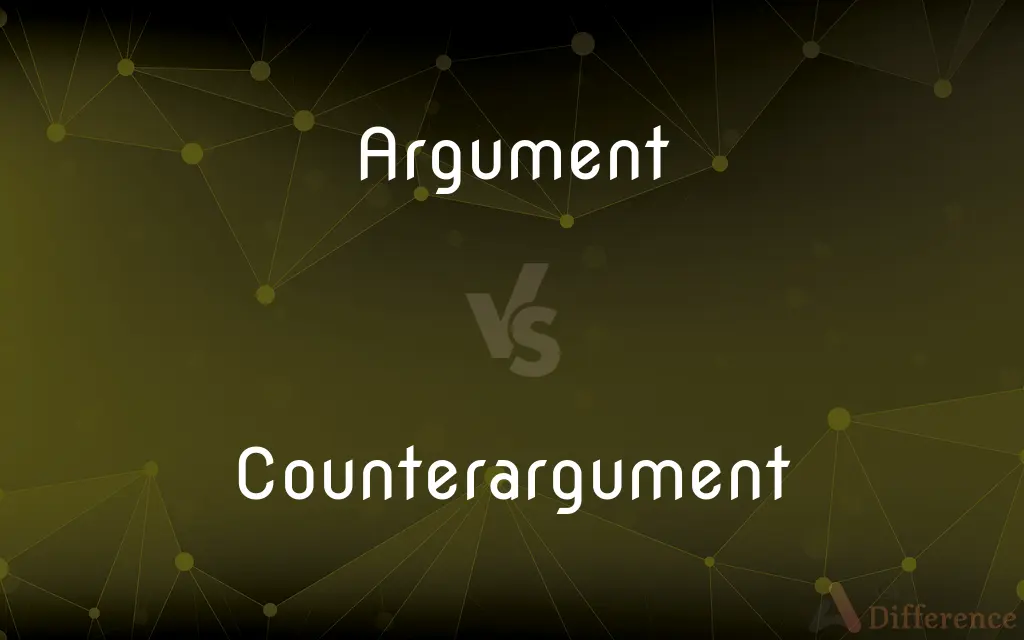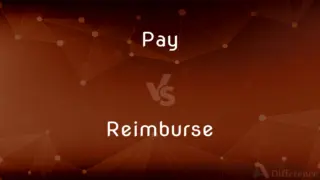Argument vs. Counterargument — What's the Difference?
Edited by Tayyaba Rehman — By Fiza Rafique — Updated on March 27, 2024
An argument presents a viewpoint with evidence, while a counterargument opposes it, providing evidence to the contrary.

Difference Between Argument and Counterargument
Table of Contents
ADVERTISEMENT
Key Differences
An argument is a series of statements typically used to persuade someone of something, presenting evidence and reasoning to support a particular viewpoint or claim. In contrast, a counterargument is designed to oppose or rebut the initial argument, presenting evidence or reasoning that contradicts the original position.
While an argument seeks to establish the validity of a claim or viewpoint, highlighting supporting evidence and logical reasoning, a counterargument examines the weaknesses or limitations of the initial argument, offering alternative perspectives or evidence.
Arguments are foundational in discussions, essays, and debates, setting the stage for a discourse by articulating a specific stance on an issue. Counterarguments, on the other hand, enrich the discourse by introducing competing viewpoints, forcing a deeper examination of the subject at hand.
Including counterarguments in a discussion or essay demonstrates an understanding of the complexity of the issue and the existence of multiple perspectives. This approach not only strengthens the original argument by addressing and refuting opposing views but also fosters a more balanced and nuanced discourse.
Effective argumentation involves not only presenting a strong case for one's own position but also acknowledging, addressing, and refuting counterarguments. This process enhances the credibility of the argument and encourages critical thinking among the audience.
ADVERTISEMENT
Comparison Chart
Purpose
To persuade others of a viewpoint with evidence and reasoning.
To oppose an argument by presenting contradicting evidence or logic.
Nature
Assertive, presenting a specific stance.
Reactive, challenging the stance presented.
Role in Discourse
Establishes the basis for discussion or debate.
Introduces alternative viewpoints and enriches the discussion.
Impact on Persuasion
Seeks to convince the audience of a particular position.
Aims to weaken the initial argument by presenting opposing views.
Contribution to Debate
Sets the stage for discourse by articulating a stance.
Ensures a more balanced and thorough examination of the issue.
Compare with Definitions
Argument
Supported by evidence and reasoning.
The argument included data on solar energy's efficiency.
Counterargument
Enhances discourse by presenting competing viewpoints.
Including a counterargument made the debate more comprehensive.
Argument
A statement or series of statements for or against something.
His argument was that renewable energy is key to combating climate change.
Counterargument
A statement or series of statements that refute or oppose an argument.
The counterargument suggested that renewable energy alone is insufficient.
Argument
Seeks to persuade the audience.
The argument aimed to convince policymakers to invest in renewable resources.
Counterargument
Provides evidence or reasoning to the contrary.
It cited examples of renewable energy's limitations.
Argument
Foundational in essays and debates.
Each essay begins with a clear argument outlining the writer's position.
Counterargument
Aims to challenge the original viewpoint.
The counterargument questioned the feasibility of a total shift to renewables.
Argument
Can be strengthened by anticipating counterarguments.
The argument was more convincing because it addressed potential criticisms.
Counterargument
Strengthens an essay by demonstrating critical thinking.
The essay was more compelling because it considered and refuted counterarguments.
Argument
In logic and philosophy, an argument is a series of statements (in a natural language), called the premises or premisses (both spellings are acceptable), intended to determine the degree of truth of another statement, the conclusion. The logical form of an argument in a natural language can be represented in a symbolic formal language, and independently of natural language formally defined "arguments" can be made in math and computer science.
Counterargument
In reasoning and argument mapping, a counterargument is an objection to an objection. A counterargument can be used to rebut an objection to a premise, a main contention or a lemma.
Argument
An exchange of diverging or opposite views, typically a heated or angry one
There was some argument about the decision
I've had an argument with my father
Heated arguments over public spending
Counterargument
An argument in opposition to another.
Argument
A reason or set of reasons given in support of an idea, action or theory
He rejected the argument that keeping the facility would be costly
There is a strong argument for submitting a formal appeal
Counterargument
Something that undermines an argument or deters someone from action
The large number of police provided a powerful counterargument to riotous behavior.
Argument
An independent variable associated with a function or proposition and determining its value. For example, in the expression y = F(x₁, x₂), the arguments of the function F are x₁ and x₂, and the value is y.
Counterargument
An argument that is opposed to another argument.
Argument
Any of the noun phrases in a clause that are related directly to the verb, typically the subject, direct object, and indirect object.
Counterargument
An argument offered in opposition to another argument
Argument
A summary of the subject matter of a book.
Argument
A discussion in which the parties involved express disagreement with one another; a debate
Philosophical arguments over the nature of existence.
Argument
An angry discussion involving disagreement among the participants; a quarrel
The roommates had an argument about whose turn it was to wash the dishes.
Argument
(Archaic) A reason or matter for dispute or contention
"sheath'd their swords for lack of argument" (Shakespeare).
Argument
A course of reasoning aimed at demonstrating truth or falsehood
Presented a strong argument for the arts in education.
Argument
A fact or statement put forth as proof or evidence; a reason
The current low mortgage rates are an argument for buying a house now.
Argument
A set of statements in which one follows logically as a conclusion from the others.
Argument
A summary or short statement of the plot or subject of a literary work.
Argument
A topic; a subject
"You and love are still my argument" (Shakespeare).
Argument
(Logic) The minor premise in a syllogism.
Argument
The independent variable of a function.
Argument
The angle of a complex number measured from the positive horizontal axis.
Argument
(Computers) A value used to evaluate a procedure or subroutine.
Argument
(Linguistics) A word, phrase, or clause in a semantic relation with a word or phrase and that helps complete the meaning of that word or phrase, such as a noun phrase that is the object of a verb. The clause that we go is an argument of the verb suggest in the sentence I suggest that we go.
Argument
A fact or statement used to support a proposition; a reason.
Argument
A series of propositions organized so that the final proposition is a conclusion which is intended to follow logically from the preceding propositions, which function as premises.
Argument
(countable) A process of reasoning; argumentation.
Argument
(countable) An abstract or summary of the content of a literary work such as a book, a poem or a major section such as a chapter, included in the work before the content itself; (figuratively) the contents themselves.
Argument
(countable) A verbal dispute; a quarrel.
The neighbours got into an argument about the branches of the trees that extended over the fence.
Argument
Any dispute, altercation, or collision.
Steve got in a physical argument with his neighbor and came away with a black eye.
While biking home, he got in an argument with the pavement.
Argument
Any of the phrases that bears a syntactic connection to the verb of a clause.
Argument
The independent variable of a function.
Argument
The phase of a complex number.
Argument
A quantity on which the calculation of another quantity depends.
The altitude is the argument of the refraction.
Argument
A value, or a reference to a value, passed to a function.
Parameters are like labelled fillable blanks used to define a function whereas arguments are passed to a function when calling it, filling in those blanks.
Argument
A parameter at a function call; an actual parameter, as opposed to a formal parameter.
Argument
A matter in question; a business in hand.
Argument
The subject matter of an artistic representation, discourse, or writing; a theme or topic.
Argument
Evidence, proof; (countable) an item of such evidence or proof.
Argument
To put forward as an argument; to argue.
Argument
To adduce evidence, to provide proof.
Argument
Proof; evidence.
There is.. no more palpable and convincing argument of the existence of a Deity.
Why, then, is it made a badge of wit and an argument of parts for a man to commence atheist, and to cast off all belief of providence, all awe and reverence for religion?
Argument
A reason or reasons offered in proof, to induce belief, or convince the mind; reasoning expressed in words; as, an argument about, concerning, or regarding a proposition, for or in favor of it, or against it.
Argument
A process of reasoning, or a controversy made up of rational proofs; argumentation; discussion; disputation.
The argument is about things, but names.
Argument
The subject matter of a discourse, writing, or artistic representation; theme or topic; also, an abstract or summary, as of the contents of a book, chapter, poem.
You and love are still my argument.
The abstract or argument of the piece.
[Shields] with boastful argument portrayed.
Argument
Matter for question; business in hand.
Sheathed their swords for lack of argument.
Argument
The quantity on which another quantity in a table depends; as, the altitude is the argument of the refraction.
Argument
The independent variable upon whose value that of a function depends.
Argument
To make an argument; to argue.
Argument
A fact or assertion offered as evidence that something is true;
It was a strong argument that his hypothesis was true
Argument
A contentious speech act; a dispute where there is strong disagreement;
They were involved in a violent argument
Argument
A discussion in which reasons are advanced for and against some proposition or proposal;
The argument over foreign aid goes on and on
Argument
A summary of the subject or plot of a literary work or play or movie;
The editor added the argument to the poem
Argument
A variable in a logical or mathematical expression whose value determines the dependent variable; if f(x)=y, x is the independent variable
Common Curiosities
How does a counterargument function in a debate?
It introduces alternative viewpoints, challenging the initial argument and enriching the debate.
Why include counterarguments in an essay?
Including counterarguments demonstrates understanding of the complexity of an issue and strengthens the original argument by preemptively addressing opposition.
Can an argument be effective without addressing counterarguments?
While it can still be persuasive, addressing and refuting counterarguments strengthens an argument by showing awareness of opposing views.
How can one refute a counterargument?
By presenting evidence or reasoning that directly challenges the validity of the counterargument's claims, thereby reinforcing the original argument.
How do arguments and counterarguments contribute to critical thinking?
They encourage the examination of different perspectives, fostering a deeper understanding of the issue and enhancing critical analysis skills.
What is the purpose of an argument?
The purpose is to persuade others of a particular viewpoint or position using evidence and reasoning.
What role do emotions play in argumentation?
While primarily based on logic and evidence, effective argumentation can also appeal to emotions to strengthen persuasion.
Can counterarguments be used in all types of essays?
Yes, counterarguments are useful in a wide range of essays, especially those that aim to persuade or explore complex issues.
Is it necessary to agree with a counterargument to acknowledge it?
No, acknowledging a counterargument is a strategy to demonstrate fairness and thoroughness in discussion, not necessarily agreement.
What makes an argument persuasive?
An argument is persuasive when it combines logical reasoning with credible evidence in a coherent and compelling manner.
How do argument and counterargument enhance learning?
They expose learners to diverse viewpoints, encouraging analysis and evaluation, which are key components of the learning process.
Can there be multiple counterarguments to a single argument?
Yes, complex issues often invite multiple counterarguments, each addressing different aspects of the original argument.
How should one choose between conflicting arguments and counterarguments?
Evaluating the strength of the evidence and reasoning presented by each side is crucial in determining which position is more convincing.
What is a common mistake when presenting counterarguments?
A common mistake is not fully addressing the counterargument or dismissing it without sufficient evidence, which can weaken the original argument.
How do arguments and counterarguments vary across cultures?
Cultural context can influence the presentation and perception of arguments and counterarguments, including the value placed on direct opposition versus harmony.
Share Your Discovery

Previous Comparison
Gus vs. Augustus
Next Comparison
Pay vs. ReimburseAuthor Spotlight
Written by
Fiza RafiqueFiza Rafique is a skilled content writer at AskDifference.com, where she meticulously refines and enhances written pieces. Drawing from her vast editorial expertise, Fiza ensures clarity, accuracy, and precision in every article. Passionate about language, she continually seeks to elevate the quality of content for readers worldwide.
Edited by
Tayyaba RehmanTayyaba Rehman is a distinguished writer, currently serving as a primary contributor to askdifference.com. As a researcher in semantics and etymology, Tayyaba's passion for the complexity of languages and their distinctions has found a perfect home on the platform. Tayyaba delves into the intricacies of language, distinguishing between commonly confused words and phrases, thereby providing clarity for readers worldwide.
















































